Ubongo Kids Club: Bringing Edutainment to Off-Grid Areas with USAID (DIV)
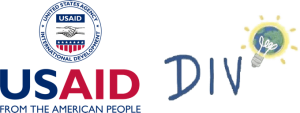
Organisation: Development Innovation Ventures (funded by USAID)
Service: Distribution and Impact Analysis
The Challenge:
Most people living in Tanzania, especially those in rural areas, do not have access to electricity. In fact, according to the 2016 Energy Access Report for Mainland Tanzania, only 16.9% of rural households actually have electricity. As a result, communities that tend to be the least economically developed, and therefore have the most need for educational support, have less access to beneficial resources like educational TV and online media.
Moreover, most people in rural communities rely on subsistence agriculture for their livelihoods. As a result, many parents and guardians rely on their children working on farms or in the household during part of the school year. This, coupled with other cultural beliefs such as boy child preference, prevent children (girls in particular) from full access to education, as they are busy with domestic responsibilities.
Consequently, kids in most non-electrified communities are at greater risk for growing up illiterate and dropping out of school because of socioeconomic realities and cultural practices. Therefore, while Ubongo currently reaches over 6.4 million households in East Africa through radio and TV, to be truly effective across demographics in Tanzania, we need to reach children in the most rural and off-grid communities in a way that is scalable and measurable.
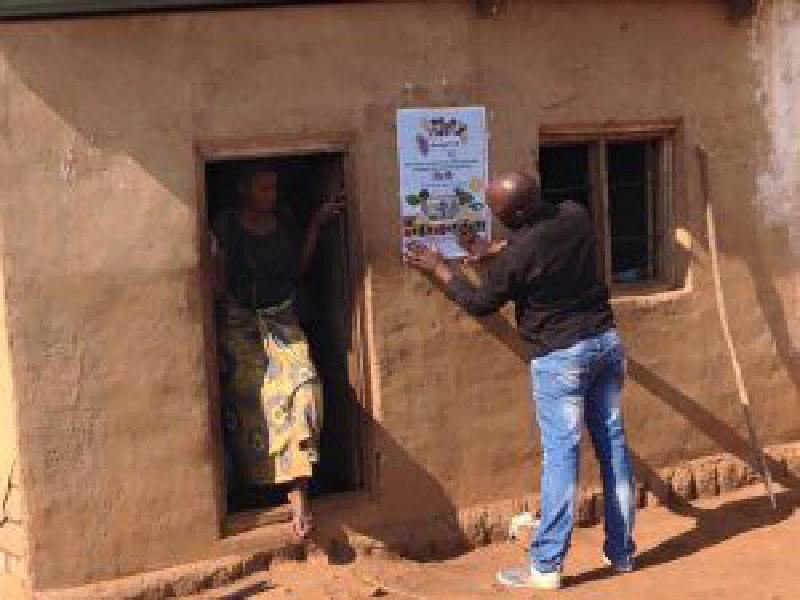
The Project:
In 2014, Ubongo received a pilot grant and technical support from Development Innovation Ventures (DIV) a program by USAID, that works with organisations that have breakthrough development solutions with the potential to change millions of lives at a fraction of the usual cost. Together, we aimed to improve the educational outcomes of children in non-electrified communities by piloting community-based video learning clubs – Ubongo Kids Clubs (UKCs).
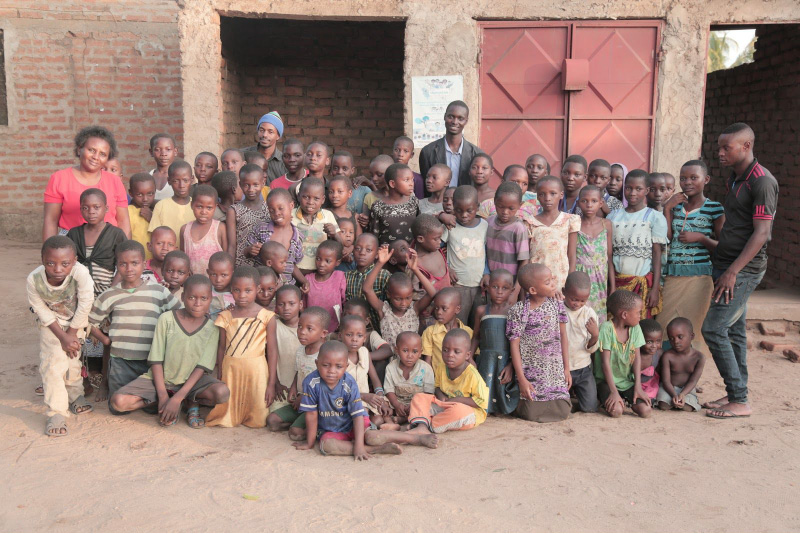
The UKCs are designed to give children living without electricity and/or in-home technology that would allow them access to Ubongo Kids and Akili and Me content, an opportunity to regularly consume our programs. The clubs are hosted at video bandas (solar or generator powered video halls common in most rural communities), so that as many children as possible can access our content. We worked with villages to screen Ubongo edutainment video content using different monetization models:
1) Pay-Per-Child: Where each child was asked to pay a small fee to attend the UKC meeting and screening at an existing video banda, operated by a local entrepreneur. The price per child was set by each video banda owner, but averaged about TZS 100 ( $0.05 USD) per session per child.
2) Sponsorship: Where the screening costs were fully subsidized for the first three-months through sponsors that we sourced, but the villages had to raise the money to continue the video banda’s in the long-term.
3) Mobile Video Unit: Where we fully operated and managed twice monthly screenings using our own mobile video units.
We also incorporated three different types of electrification models: two villages used a solar-powered generator provided through a solar media center partner (Juabar), one village used petrol-powered generator, and one village used it’s own solar-powered generator. Two of the video banda’s were pre-existing and two were built by villages where no video banda had previously existed.
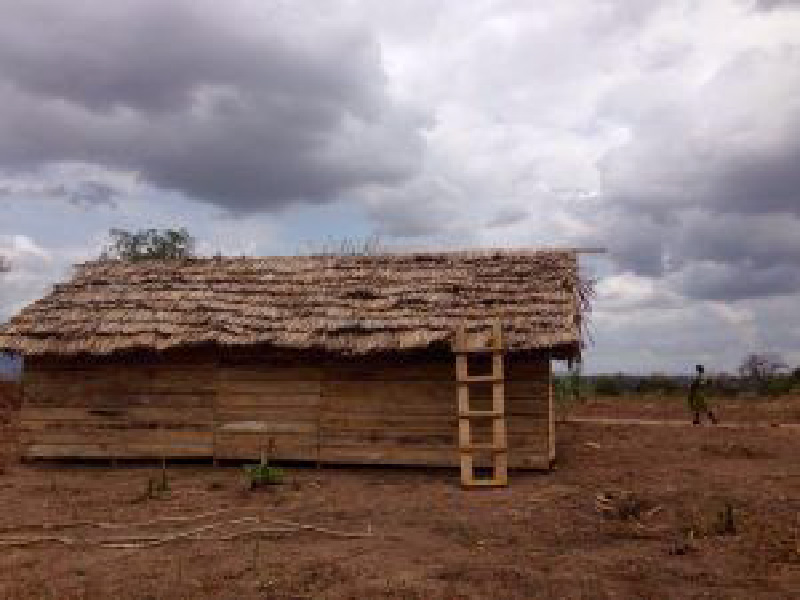
Communities selected had an average of 1 hour 20 minimums drive time between them, to avoid movement of children between experimental groups. Within each community, we identified a community ambassador (CA) who was trained to facilitate UKC’s and collect attendance data to help us track UKC’s. The CA was provided with Ubongo Kids episodes on DVD and activity plans for each episode of Ubongo Kids and Akili and Me, given the freedom to independently organize at the community’s own discretion.
We hoped that an effective scale up plan would be derived from this pilot project, and potentially offer millions of off-grid children and their families access to affordable and appropriate learning products.
The Impact:
We received an overwhelmingly positive response from communities participating in pilot, and many of them are continuing to run and manage their own grassroots Ubongo Kids Clubs out of video bandas without external sponsorship.
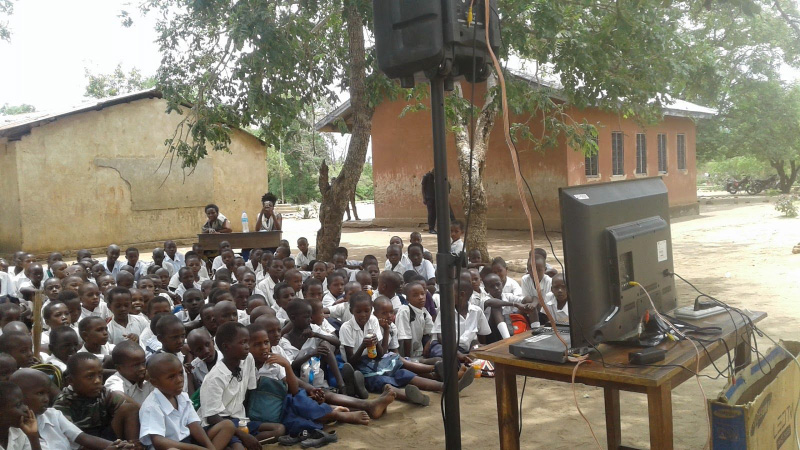
Kids watching Ubongo Kids cartoons
In order to fully understand the advantages of each pilot model, we evaluated academic performance, attendance trends, and qualitative information across treatment arms, as well as a control group who did not watch any of our programs.
Academic Performance — We conducted a six month, clustered experimental trial to assess learning outcomes for students in classes 4-6 in communities with and without video bandas screening Ubongo Kids and Akili and Me.
Overall, the intervention group improved significantly (4.6 percentage points) over the six months (p=.000) while the control group (who did not watch the programs) showed no significant improvement in overall math, science and reading scores over that period.
Students in communities with Ubongo Kids clubs improved more than the control groups across all learning areas, with a 7% gain in reading, 4% gain in math, 4% gain in science, and an overall effect size of 0.35 from watching Ubongo content (when controlling for other factors such as school, age and gender).
Gender expectations– In general, fewer girls attended screenings than boys. This could be due to family understandings about the merits of educational attainment in girls versus boys, and due to girls having more household responsibilities after school and on the weekends. The implied perspective is that boys are more deserving of educational opportunities–and more capable of capitalizing on them–when resources are scarce.
We recognize that for this model to scale and impact all kids, we need to make a concerted effort to work with communities to ensure that girls are given access to more educational opportunities, including attendance of screening clubs.
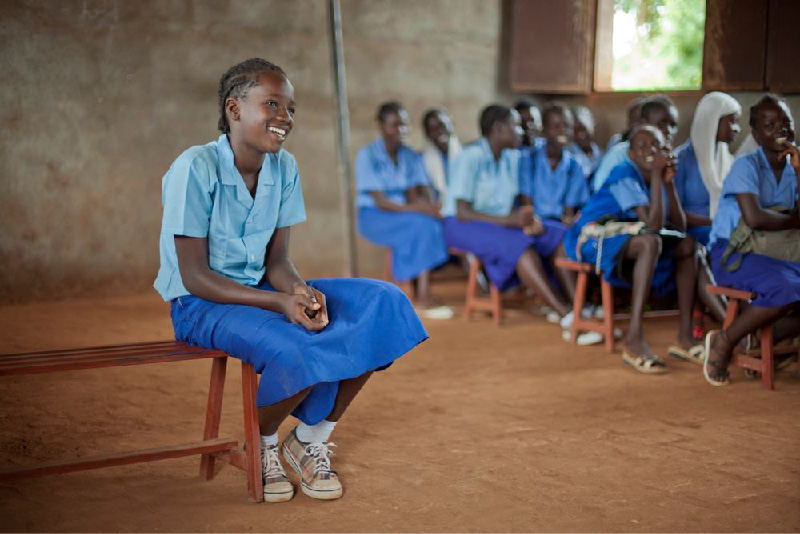
Girl students
Economic constraints– Even with very limited disposable incomes, most parents surveyed in the Morogoro villages expressed that they could regularly pay the 100TSh PPC cost for the child to view the Ubongo content. However, we see that attendance declined across the PPC screenings, even accounting for variations in screening availability. This could be because the novelty of the program diminished among children, or because families reassessed the value of the content once the costs became continuous. Nearly a third of the teachers surveyed in all villages recommended against the PPC model.
Opportunity costs of attendance– Most families in the villages depend on agriculture for staple foods and income. Especially during planting and harvesting, children often join parents in the fields. This can reduce percent attendance at the UKC sessions, especially in the models where screenings were frequent. Long distances from homes to the bandas can also pose a challenge for children looking to attend the screenings. The attendance of the Mobile Video Unit villages was affected by church activities, which often took place on the Saturdays when the MVUs were in the villages. These barriers to attendance, which were reported by banda owners and community ambassadors, impacted children in all models.
In Njeula, a village dispersed across a large area, a new solar media center was built across from the community school. This banda was used for the duration of the intervention, but afterward, the solar and screening equipment was returned and the banda fell out of use. Now, the community ambassador uses another banda within the village center to screen Ubongo content with his own solar equipment. Attendance is generally high and the banda owner covers his costs.
In fact, teachers in Njeule have reported that:
“Recently the number of absentees has decreased since they know that they are going to watch the programs after school session.”
















